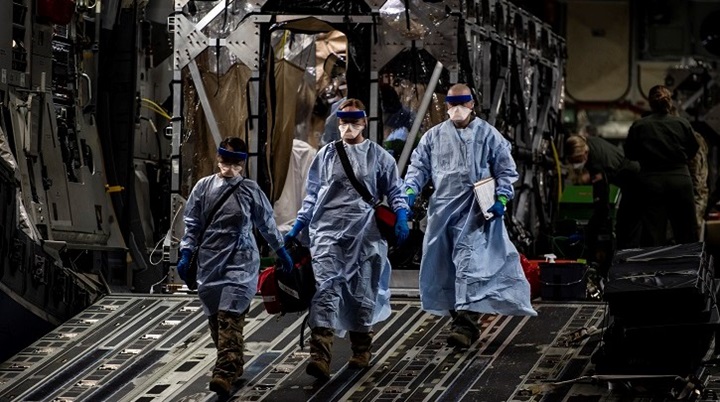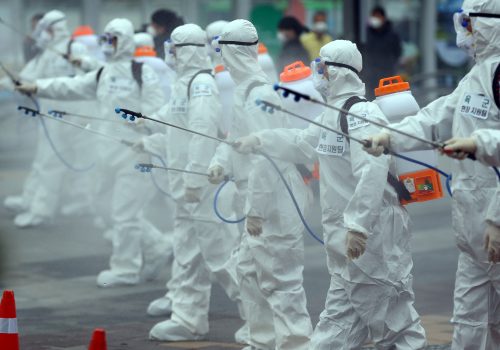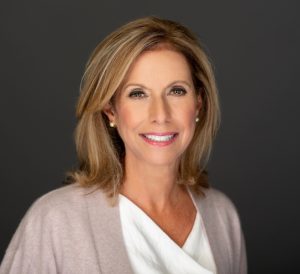What world post COVID-19?: A conversation with Dr. Kim Roberts
This interview is part of a series conducted by the Atlantic Council’s Foresight, Strategy, and Risks initiative on the potential impacts of COVID-19. The interviews feature insights from the FSR initiative’s Nonresident Senior Fellows, a set of experts drawn from across a wide range of fields. In this interview, Dr. Kim Roberts, Professor of the Practice of International Relations and Director of Graduate Studies at Georgetown University’s Security Studies Program, shares the ways that the pandemic has changed security studies, and discusses the implications of the pandemic for national security, geopolitical competition, trade, and higher education.
What are the big picture issues that you are working on in your field and how do they matter for understanding the world? How have they been impacted by COVID-19?
In my field, this pandemic has cemented a broader definition of “national security.” We have traditional security challenges, but others have been raised up the priority list, such as health security, food security, and climate change. Now, I don’t see how these issues are going to be ignored, throughout every theoretical camp [in Security Studies]. My students, especially those from a military or intelligence background, are looking for a broader definition of security.
Globally, the pandemic is accelerating international division. I find this disheartening because so many of our international security issues, including the pandemic, are linked. We are not going to be able to solve any of these far-reaching problems without cooperation.
Advocates of US retrenchment from global leadership need to realize that it would create a vacuum. Who will fill it? China is obvious, but their reputation following the pandemic is mixed. While they are attempting to increase their soft power, they are also being blamed from many corners for the pandemic’s outbreak.
Regardless, any country that takes the global lead will influence global norms. For instance, after the fall of the Soviet Union, President George H. W. Bush called for a new world order and the United States used its democratic status to shape global norms. If the United States retrenches, what are these new norms going to look like?
The pandemic is just the first in a series of crises, of which climate change especially will be difficult, as it will exacerbate pandemics, health and food security, at the same time.
Can you share in a little bit more detail how COVID-19 has affected your research priorities? And what are some new projects or ideas that you’re considering?
At Georgetown, I teach a class on the impact of multinational corporations, as well as a theory class, where we look at globalization and cooperation.
First, I think global supply chains are changing. A transformation was already underway, as many experts were arguing that globalization had already reached its peak, but COVID-19 is accelerating it.
Global supply chains generate peace dividends. If a company is manufacturing components across different countries, those countries tend to be more peaceful with each other because it is not in their economic interest to be in conflict. With the pandemic, what we are seeing is that we will want to bring some manufacturing home for essential goods, or at least be able to have some industries transition quickly to producing those goods. While global supply chains will not be abandoned, the pandemic has exposed their weaknesses. Some companies like Samsung were nimble enough to be able to move some of their production from China to Vietnam once the pandemic hit, many were not. As countries became sick from COVID-19, that began shutting down production for entire chains. So, I will be exploring how global supply chains are adapting after COVID-19.
Second, as mentioned previously, I also want to look at food security and climate change, especially from the perspective of corporations. How can corporations come to the forefront of a crisis like this? How can public-private partnerships evolve and be more effective? Currently, we have a plan for this, Title VII of the Defense Production Act, which stipulates executives from industry can work with the government. Could that be put into motion? Could we plan for what is coming next? The pandemic is just the first in a series of crises, of which climate change especially will be difficult, as it will exacerbate pandemics, health and food security, at the same time.

It seems we are at a crossroads. There is an equal chance that we realize the current crisis needs global cooperation and coordinated responses, just as there is the danger of going for nationalistic answers and making this a domestic issue. What do you think are the factors that could make us pick one alternative future over the other?
In one of my classes this semester, I had my students participate in a crisis simulation. The class was divided into two groups and their assignment was to come up with a National Security Strategy after the pandemic. One group came back with an isolationist strategy, and the other group came back advocating for multilateral cooperation. I thought that it was fascinating that they went in completely different directions, and it was a microcosm of where we are right now.
How engaged should the United States be? I was looking at a Pew Research Poll, and one of the questions was on pandemic cooperation—97 percent of respondents said that they supported international cooperation to fight infectious diseases. I thought this is important to explore. Even during the Cold War, the Americans and the Soviets cooperated in their space programs. They were able to work together, on that level, and I think that presents a valuable lesson. The United States and the world should ask themselves: where should we cooperate? How can we work together? It doesn’t have to be an all-in cooperation, I do not think that the geopolitical context allows. But this could be a start, and it is in our own national interest to solve the pandemic’s fallout.
Especially today, and even if realist scholars disagree with me, we cannot escape the need for cooperation. We can talk about decoupling, but the danger is that vaccines can be instrumentalized and used politically. You have to decide what your priorities are and what kind of society we want.
Speaking of cooperation, how do you see the level of sub-national cooperation that has emerged in the aftermath of the pandemic? For instance, parallels with the Paris Climate Agreement, where after the US federal government withdrew from the accord, states, cities and businesses stepped up and committed to the goals, in spite of the absence of federal leadership.
I think the work at the state and local levels [sub-national] is absolutely fascinating. This cooperation is out of necessity, and necessity breeds innovation. But the future is uncertain. We still need the US federal government on board. Take for instance the conference that Europe and much of the world had on finding a COVID-19 vaccine back in May. The United States opted out, and as mentioned before, without US leadership there will be a vacuum and somebody will fill it.
Again, norms are so important, and whoever is the global leader sets these norms and values and exerts influence. Unless the United States does so, we will be living under the influence of someone’s else norms. We have to decide, as a country, if that is what we want, if we are ready to give up this norm-setting role after striving for it for so long. Take the example of the demise of the Soviet Union. Circumstance played a big part in the demise of the Soviet Union, it wasn’t a decision to give up power. Compare that to the US.
In ten or twenty years, how are we going to look back at the United States? Did the United States voluntarily give up its global power? What benefit is there to doing that?
Where does civil society fit?
There is a lack of awareness and understanding of what leaving the global community would do for our country.
A closely related issue is education. How do we educate our society, especially during a time in which technology enables disinformation and deep fakes? There was already a problem in the United States in terms of polarization and questioning the US role in the world, and disinformation has exacerbated the problem.
Without education, a democratic nation does not have a solid foundation. That is an important insight, and I worry about education in the United States. It is important to consider technical education, but we also need to have a liberal education, learning about civics and international relations. Now, we often think of a liberal education as a luxury, but it is of fundamental importance.
Sign up for the FSR Newsletter!
Sign up for the Foresight, Strategy and Risks newsletter to remain up to date with our events, publications, and much more! Learn about global risks, technology, emerging security issues, and geopolitics, and discover how current events fit into long-term trends.
From your perspective, how should we think through the impact of the pandemic on education and students? In the long-term, what is the economic impact for a generation that has already gone through another crisis, in 2008?
This pandemic has taken the veneer off problems that were already there. At Georgetown, everybody wants to be in person and back on campus, because education is also a social, human experience.
Economically, this is going to be devastating, not just for a generation, but to our society. We have had so many of our students lose opportunities over the summer, internship opportunities that just disappeared, internships with the federal government that disappeared. They are actually taking classes this summer instead.
A question is, how many students will not be attending school this fall semester? I think the percentage will be higher for undergrads than it is for graduate students.
There are incredible inequalities for elementary students, high school students, middle school students who do not have the technology to be on Zoom.
The pandemic’s impact will be tracked for a generation to come, both in terms of educational access and attainment, but also for society as a whole. Quality of education is going to be part of conversation, and for the society at large, I hear many economic experts talk about the need for higher taxes. We can’t have a thriving democracy without equal education.
Regardless, my advice for students is to prepare themselves for what comes next. We were talking earlier about different types of security policy that are coming to the forefront: this is the time to be ready to be part of the conversation there and one day join the leadership that makes decisions.
In this context, it is interesting to observe the international component, and whether the pandemic will affect the decision of people to come into the United States to pursue degrees in this country, and then move on to be part of the workforce.
That is what the nation is about. We are about immigration. We will see what happens in November, at the US Presidential election, but that is our strength. We cannot afford to lose the connections that we have around the world. I was talking earlier about globalization; so many are saying it reached a peak and was on a downward trend anyway, but there are so many benefits to globalization. I hate to see us pull back further than we have to.
The final word for our readers. What is around the corner? What are some of the key issues or uncertainties that are at the top of your mind as we move into this new phase of the pandemic?
I think there is a lot of uncertainty going forward. On a personal level, mental health experts say we should be looking at the short timespan, because thinking beyond that is daunting. What are you going to do tonight? What are you going to do tomorrow?
What does COVID-19 mean for the world? China is trying to gain soft power, but it is also being blamed for the pandemic. It’s having trouble with nations that it normally hasn’t, like threatening sanctions on Australia.
We do not know what the leadership of the United States is going to look like. Are we going to change direction? Is there going to be any US global leadership or is it just going to withdraw from everything? What about the sub-national level? We’ve seen governors step up to the plate where they might not have before.
There is also an acceleration of trends, for instance technology. What is the impact of the pandemic on privacy, when it comes to contact tracing? Who is going to win this technology race? Is China going to win the 5G race? Is the EU going to be able to hold together?
There is a combination of strategic shocks and trends, economic, geopolitical, which make predictions difficult. For now, there are more questions than answers, for sure.

